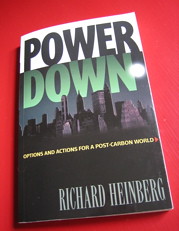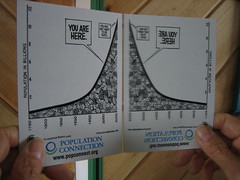Beyond Petroleum?
In Bush's state of the union address we all heard him say the words "addicted to oil". I was elated for the rest of the week. I know, I know. This doesn't mean he'll actually do anything about it, but at least we can now hear the problem addressed from all fronts. CNN's recent hour long report, the "don't say we didn't warn you" special, was one of the more public assessments, showing six times over last weekend during prime time. (We Were Warned: The Coming Oil Crisis.)
Unfortunately their report slanted the problem with oil as a homeland security risk, which it is, but that's like saying you'll need a blood transfusion if you get hit by a car when what's really putting your health at risk is morbid obesity. And that's what America is, morbidly obese from our intake of oil.
Our history since the 1930's was shaped by huge oil reserves. This glut of oil made us the oil dependant nation we are today. All that oil money has been steadily influencing first Texas, then national policy in order to assure a market for oil that was so cheap no one could make a profit on it unless we were all convinced or forced to transport ourselves and everything we needed over long distances, in gigantic vehicles, as often as possible and use manufactured goods made by oil consuming factories and buy only food made with oil derived pesticides, harvested by humongous oil driven machines.
It is why we have a train system that would put Bulgaria to shame and public bus systems that make you feel you're picking up a welfare check should you ever have to take one. It is why we have sprawl, and suburbs full of kids that have to be driven everywhere and why, if you want a tax deduction (up to $100,000) on the car you lease for your business, it has to weigh in at 6,000lbs. Huh? But we're an oil importer now, shouldn't we be giving tax deductions to high mileage cars?
Call it a bad hangover. We woke up to our oil obesity in the 70's then when right back and poured ourselves a double and chalked it up to bad politics with the Saudi Arabians. It's been downhill ever since. The golden age re-gilded repeatedly with military might to control those other oil exporters we were now dependent on. This much you know because we are living it.
As soon as our oil demand exceeded our oil production, the golden age was over. The good America, the one that created so much wonderful stuff manufactured on our own shores, the one that had so much money from all the stuff we were selling overseas that we were the biggest loaners of cash in the world. The country that was the most generous, the most wealthy is now just a lumbering, paranoid, diseased hulk looking for the next hit of oil.
The word addiction implies that we can recover or more likely go to an alternative - shoot up ethanol, forage for grease scraped from the dumpster behind McDonalds to make bio-diesel, get technology to retrofit ourselves a hydrogen economy, bury our heads in the Canadian tar sands, give everyone a deduction on a plug-in hybrid. Anything but to stop using.
But addiction is only part of the problem. What we are stuck with is the energy obesity built into our physical environment and the population bloom as a result of our incredible success as a species aided by this rabid consumption of oil. Oil expanded our ability to trade, grow food, transport goods and people and live on a steep hill in a condo with a view.
Human labor is virtually inconsequential today because of the prevalence of machines. To get a feel for this, imagine pushing your car instead of driving it. Imagine pushing it up hill and down dale and all the way to work and back. It would probably take weeks. You might wish you had gotten on a bicycle instead. (A bicycle is the most efficient mode of transportation on the face of the earth. More efficient than walking even, in terms of carbohydrates consumed.) We get weeks of human labor for the price of one gallon of gas. Oil has created for us superhuman leverage to expand our ability to consume and, in turn, produce more consumers.
At an all day workshop, last week, given by Real Goods, called "Powerdown: The End of Cheap Energy", Catherine and I saw a recorded lecture given by professor Albert Bartlett on exponential growth. It was a lesson I remember learning in high school. Something about the population of fish and the limitations of a pond. Every day the population would double. The day they filled the pond, all the food would be gone and they starved and died off.
The profound lesson that I did not forget was the answer to the question - how full will the pond be the day before it's completely full? Well, heck, it would only be half full. Half full looks pretty hunky dory, I realized and learned the warning that I was meant to see, that we would think everything was fine almost immediately before we reached our limits. But those who would warn of the population boom that would do us all in were proven wrong and the human population doubled without much consequence to my life.
As our workshop presenter, peak oil guru Richard Heinberg, would reveal, it was not so much the number of bodies that counted, or even the amount of food we could produce, though that was certainly a factor, it was the energy we needed to make that food and get it to our mouths that mattered. Our first world lifestyle is more machine than human. We have an infrastructure to feed in order to grow food, harvest it and get it to our stores. Oil is the food we need to carry our hulking energy obese body upright.
Richard confirmed for me what I had already been at pains to explain to a dinner guest, that the biggest population growth problem, in terms of planetary survival, is here in the United States, not in those poor third world countries of high birth rates, mass starvation, AIDs and poverty.
Each one of us consumes massively more than a person in Bangladesh. They could have 25 more people in their house to be equivalent to what Catherine and I and the cat consume in terms of energy. (I'm betting Tango consumes more energy than an average Bangladeshi what with all the specially processed kidney disease abating canned foods, shots of antibiotics and vet visits.)
And we're not going to make up for it by being the nation to produce the next genius who invents the silver bullet that solves all our problems. We're not even listening to the geniuses we already have.
But this is not a tirade on population growth, though we would do well to consider our reproductive proclivities. This is a plea to consider the impact of our consumption as a nation. What is it about our lifestyle that is non-negotiable? What kind of diet do we need to go on, or should we just have our collective stomach stapled?
According to Albert Bartlett's lecture on exponential growth we can't really afford any kind of growth at all and therein lies the rub. The same arithmetic factor that allows us to retire with only 12% annual growth to our IRAs, thus doubling our money every 7 years, is exactly the same arithmetic miracle that we should pay attention to in terms of energy use because, as we know, oil is not forever.
Only we didn't really know it like this, like yeast making beer in a sugar solution, because, as Richard showed us with a chart of yeast production in 10% sugar water, our hockey stick growth looks exactly like yeast eating up sugar. And the other side of that hockey stick is a downward slope just as severe. The yeast die because they run out of sugar very quickly, then suffocate in their own waste. Then we humans swill that waste down as beer. Pretty smart of us if want to drink beer, but not if we're the yeast.
The yeast to beer analogy pretty much describes our triad of global crisis. Here we have diminishing oil resources (the food), a population bloom caused by earlier consumption of that food (the hockey stick growth) and catastrophic climate change brought on by greenhouse gas emissions - the waste created by our consumption of oil.
But Richard did not give this workshop just to enlighten the eight of us, who attended, as to how our grandchildren would end up as beer. Richard was putting forth the Oil Depletion Protocol.
Just as the Kyoto protocol was to cut greenhouse gas emissions, so the Oil Depletion Protocol would serve to calmly and in an orderly fashion show us how to walk, single file, out of the burning building. It just makes you want to practice right now like a fire drill. How much can I reduce my energy use?
According to the Oil Depletion Protocol we only need to reduce global production and consumption of oil by about 3% per year to match the rate of declining oil supplies. The protocol works out the details according to how much each country is importing or exporting.
Doesn't seem like that much does it? In fact Richard thought that we, in the US, could cut our energy consumption by 30% without even noticing. California has already shown the world how we have leveled out our consumption of electricity. We are now the model that China is consulting. (We are, however, still growing our electric consumption, just not as fast as the rest of the nation.)
What we have to give up is the idea that growth is good. Even our own government's experts have said as much in a report on the impact of peak oil for the Department of Energy. The author, Robert L. Hirsch, urges government intervention to mitigate the impact rather than leave it to the market. Market forces can only detect immediate scarcity. It would not, for instance, detect scarcity the day before the pond was full.
We have to give up on growth altogether in terms of energy use. Our resources simply won't stand for it. We cannot turn to coal, for example, in the hopes that our huge coal reserves would allow us to continue business as usual. Given the kind of growth we have been enjoying, we would make short work of coal supplies, as well, in about 20 years. Just as those fish in the full pond would populate another pond (should they send out explorer fish to find one) in only a single day.
Nor can we have sustainable growth or "smart growth" as some environmentalist espouse. Smart growth is like deciding to buy a first class ticket on the Titanic, Richard pointed out. You're just going to your death in style. There is no such thing as growth that is sustainable. The question is can we reverse our yeast like drive to growth and use our smarts to cut back consumption soon enough to avoid extinction? Are we smarter than yeast?
Posted concurrently at the Energy Bulletin







